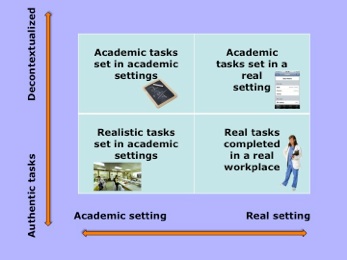Learning Needs a Context
This is a follow up to a post I wrote, How Do We Learn? How Should We Learn? The purpose of these posts is to encourage educators to examine practices they take for granted, implement without deep reflection of their efficacy. This post discusses the instructional practice of asking students to memorize information.
How often have students (ourselves included) been asked to memorize mass amounts of facts – historical dates, vocabulary words, science facts, get tested on them, just to forget almost all those memorized facts a week or two later? Given that is this learning experience is more common than not, why do educators insist on continuing this archaic and ineffective instructional practice?
To learn it in isolation is like learning the sentence “Hamlet kills Claudius” without the faintest idea of who either gentleman is–or, for what matter, of what “kill” means. Memorization is a frontage road: It runs parallel to the best parts of learning, never intersecting. It’s a detour around all the action, a way of knowing without learning, of answering without understanding. (When Memorization Gets in the Way of Learning)
The more closely we inspect this model of teaching and testing, the more problematic it reveals itself to be. First, there’s the question of what students are made to learn, which often is more oriented to factual material than to a deep understanding of ideas. Second, there’s the question of how students are taught, with a focus on passive absorption: listening to lectures, reading summaries in textbooks, and rehearsing material immediately before being required to cough it back up. Third, there’s the question of why a student has learned something: Knowledge is less likely to be retained if it has been acquired so that one will perform well on a test, as opposed to learning in the context of pursuing projects and solving problems that are personally meaningful. (Alfie Kohn)
The visual image I use to describe this is that there are all of these unconnected facts floating around in the learner’s brain. Since they have nothing to connect to, they end up flying away. This is especially true for abstract concepts.
Memorizing facts often means a waste of students’ time and energy. In some cases, too many cases, learners lose their passion and excitement for a subject or topic that, if taught in another way, may have not been the case.
The Need for Context
Learning facts and knowledge about a content area topic is an important prerequisite to understanding that topic and then developing expertise. The key to this understanding is providing a context for the facts. The context becomes the glue to increase the stickiness, the longevity of long term memory of those facts. This is especially true for abstract concepts. These concepts need something concrete with which to attach.
Lave and Wenger (1991) argue that learning should not be viewed as simply the transmission of abstract and decontextualised knowledge from one individual to another, but a social process whereby knowledge is co-constructed; they suggest that such learning is situated in a specific context and embedded within a particular social and physical environment. (Situated Learning)
Increasing Context and Relevancy
Authentic learning can be the driving force for increasing context and relevancy. Jan Herrington describes authentic learning along two axes – the authenticity of the task is on one axis (from authentic to decontextualised), and the setting is on the other (the classroom/university to the real setting). The goal of educators should be to increase authenticity which leads to more contextual learning (and vice versa).
 (http://authenticlearning.info/AuthenticLearning/Matrix.html)
(http://authenticlearning.info/AuthenticLearning/Matrix.html)
The following are some suggestions for establishing context (the list is just a start). Ironically, they are practices that are often recommended are best practices in teaching but they aren’t implement as often as they should be:
- Assess and Connect to Learners’ Real Life and Previous Experiences with the Topic – see http://ideaedu.org/research-and-papers/pod-idea-notes-instruction/idea-item-11-related-course-material-real-life
- Use Hands-On and Experiential Activities – see http://www.raft.net/case-for-hands-on-learning
- Use Case Studies and Simulations – see https://www.cmu.edu/teaching/designteach/teach/instructionalstrategies/casestudies.html
- Have Learners Engage with Real World Practitioners – see http://www.nbcnews.com/video/nightly-news/52279118#52279118
- Implement Place-Based Learning – see http://www.ourcurriculummatters.com/What-is-place-based-education.php
The bottom line is that regardless of the content area, students deserve educations that have self-perceived authenticity, relevancy, and a context that makes sense.


Yes that is when it works best. Great post!
Fashionable Librarian
March 21, 2015 at 6:20 pm
Very useful post! I only want to echo these thoughts and ask that we think of this also in adult learning contexts such as teacher professional development. ‘Sit and get’ without opportunities to connect the content to experience and previous knowledge through dialogue, writing, or practice simply becomes a waste of time and energy. It becomes sitting without getting very much at all.
edifiedlistener
March 25, 2015 at 12:53 pm